Disclaimer: This post is sponsored by the American Heart Association (AHA); however, all opinions and editorial comments remain my own. All content at thefitfork.com is provided for informational purposes only and does not constitute the providing of medical advice and is not intended to be a substitute for independent professional medical judgement, advice, diagnosis or treatment.
Did you know blood pressure is the second most common cause of preventable death in the United States from any cause and that nearly half of all adults in the country, an estimated 103 million, have high blood pressure? These startling statistics really caught my attention, especially since cardiovascular disease runs in my family, and I’d like to do everything I can to maintain a healthy blood pressure level and prevent a future heart attack, stroke or other life-threatening condition. 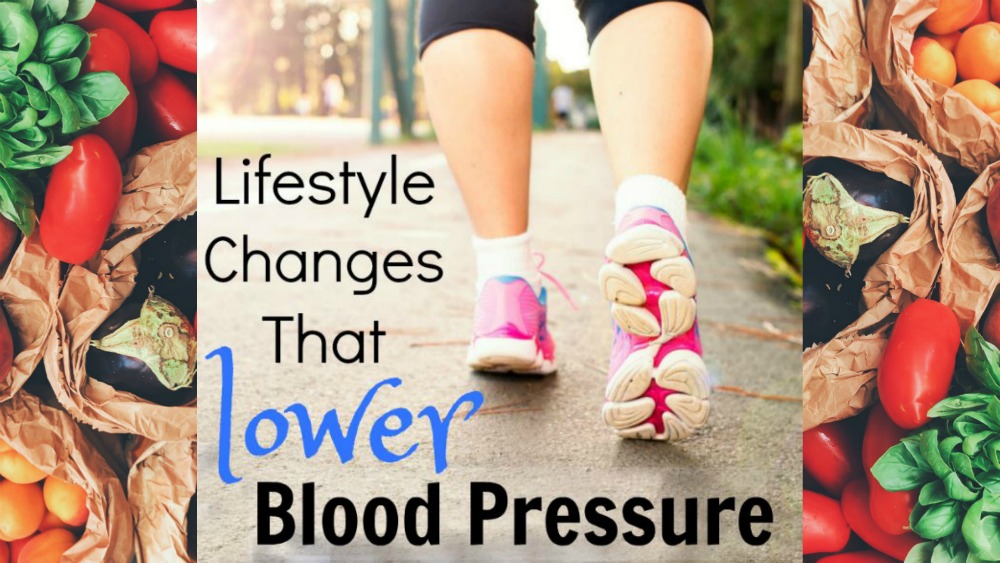
May is National High Blood Pressure Education month and I decided this was the perfect opportunity for me to keep sharing about and motivating people to get on board with my two life passions – eating a balanced “real food” diet rich in fruits, veggies, and lean protein and engaging in some form of exercise daily. Read on to learn more about these and other actionable lifestyle changes you can make to help control your blood pressure in a positive way.
High blood pressure (also known as hypertension) can be a sneaky, insidious thing. That’s why it’s often referred to as “The Silent Killer,” typically coming on with very few if any symptoms at all.  My dad has high blood pressure and that’s something you would never guess by looking at him. When I was growing up, he was always “the vision of health,” that lean, fit-looking guy who appeared younger than his age (even enough so sometimes people though he was my older brother). But lurking under the façade of good health, he had uncontrolled high blood pressure which, unfortunately, contributed to his first heart-attack during his 40s. That was “fixed” with an angioplasty, medication and lifestyle changes, but eventually things further complicated into a complete cardiac arrest at the gym (thank God for a nearby automated external defibrillator) and subsequent triple bypass heart surgery in his early 60s.
My dad has high blood pressure and that’s something you would never guess by looking at him. When I was growing up, he was always “the vision of health,” that lean, fit-looking guy who appeared younger than his age (even enough so sometimes people though he was my older brother). But lurking under the façade of good health, he had uncontrolled high blood pressure which, unfortunately, contributed to his first heart-attack during his 40s. That was “fixed” with an angioplasty, medication and lifestyle changes, but eventually things further complicated into a complete cardiac arrest at the gym (thank God for a nearby automated external defibrillator) and subsequent triple bypass heart surgery in his early 60s.
A great first step in taking care of any current or potential blood pressure issues is to get support. You may be reading all of this wondering how do you even know if your blood pressure is too high (is now classified “high” with a systolic reading of 130 or higher, or a diastolic reading of 80 mm Hg or higher), especially since the condition doesn’t present with a lot of symptoms. First off, visit with your doctor and physical combined with conversation about your cardiovascular health is in order. Additionally, armed with your blood pressure numbers, you can learn more about your risk using the American Heart Association’s Interactive Blood Pressure Chart.
Do not leave your long-term health to some short-list found on Google . . . and that including this blog post! Nothing can replace the face-to-face interaction, diagnosis and management provided from an actual, real-life, medical professional.
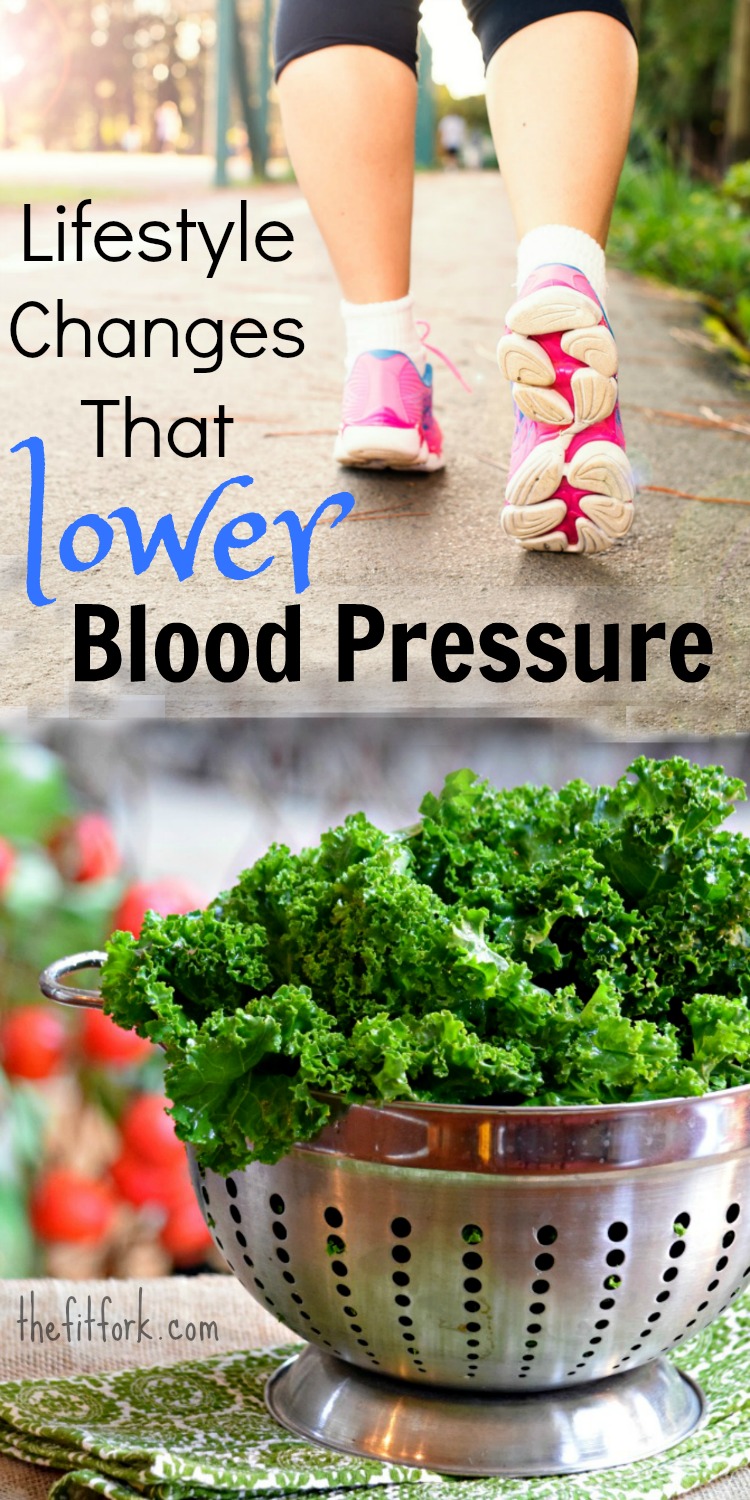
Lifestyle Changes That Can Lower Blood Pressure and Improve Overall Health
Eat healthier: Consume an abundance of vegetables and fruits, complemented with low-fat dairy, whole grains, and lean proteins with less saturated and total fat. These are “real” foods; avoid overly-processed, high-fat, high-sugar, high-sodium packaged foods. People seem to like to align themselves with a “diet tribe,” and there are so many trending ones out there right now that are NOT so great for heart health and blood pressure. However, eating patterns that CAN support positive changes in blood pressure include, but are not limited to, the DASH diet (acronym stands for Dietary Approaches to Stop Hypertension) and the Mediterranean Diet. Also, while I AM a dairy, egg and meat-eater, vegetarian and vegan diets can be beneficial for those concerned about high blood pressure and heart health. However, my two cents would be that special attention be paid toward sourcing the nutrients lost by giving up animal products. 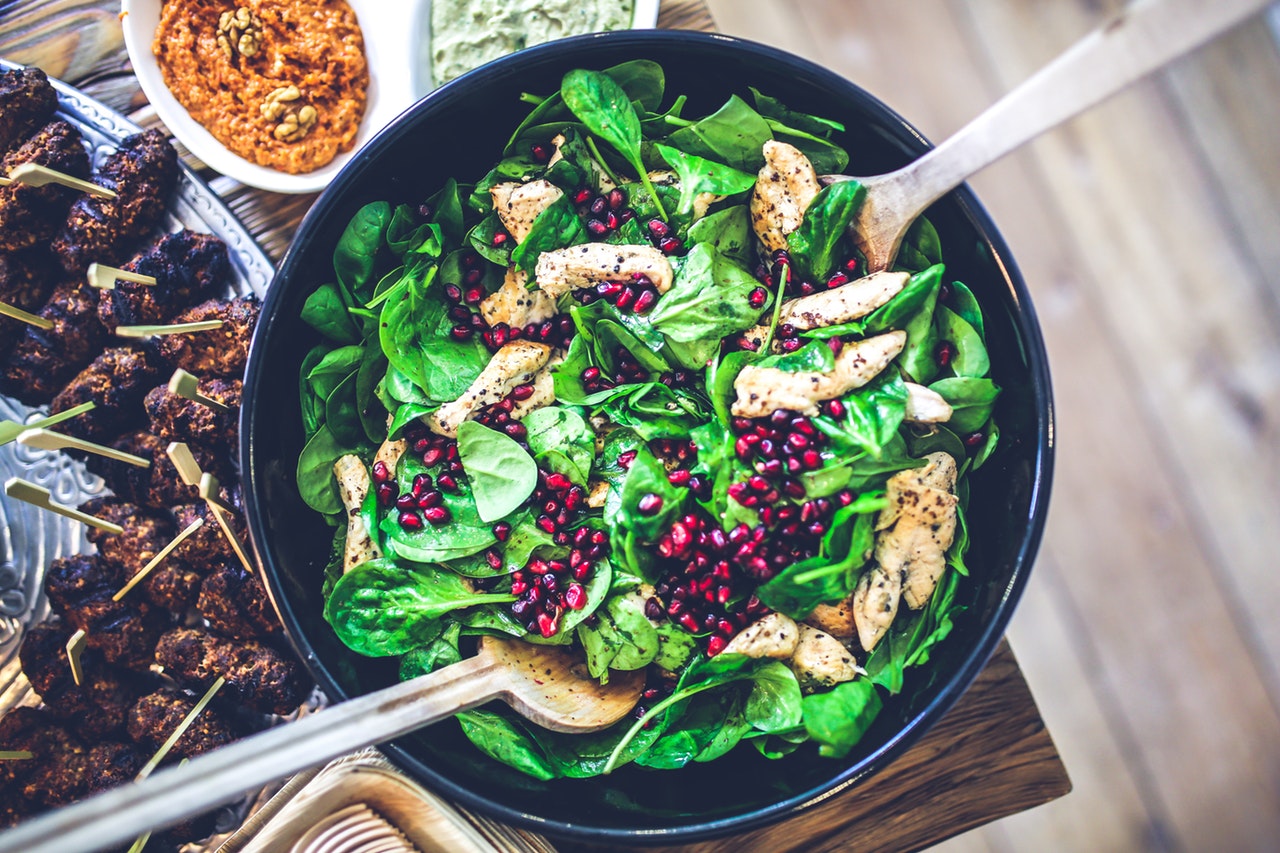
As for my diet, I fill half of my plate with leafy green salad and/or fruits and vegetables – the remaining is split between a not-overly salted lean protein and grain or starchy vegetable. I also love an entree salad (like pictured) with about 3 ounces of cooked protein. An easy heart-healthy recipe that is great for meal-prepping and spinning off a variety of different meals, is my Honey Garlic Slow Cooker Chicken. I’ve even taught my college kids (2 of my 3 boys now) to make it so they can load up their apartment freezers with protein.
Exercise Daily: Aim for 90 to 150 minutes per week of mild to moderate physical activity to support long-term health and reduce blood pressure. Try cardiovascular activities like running, walking, swimming or group fitness classes alternated through the week with resistance strength training using gym equipment or even body weight. Even on “rest” days, which are important too, I always do a physical activity I enjoy – but at a less intense effort. This includes everything from walking the dog to working in the garden. Yoga is another good form of exercise to include in your routine and can help to reduce stress – and reducing stress helps manage blood pressure!
Reach & Maintain a Healthy Weight: The good news is that by eating healthier and engaging in daily exercise, it will be much easier to get and stay at a weight that supports heart health. Doctors recommend a body mass index (BMI) between 18.5 and 24.9 for optimal health.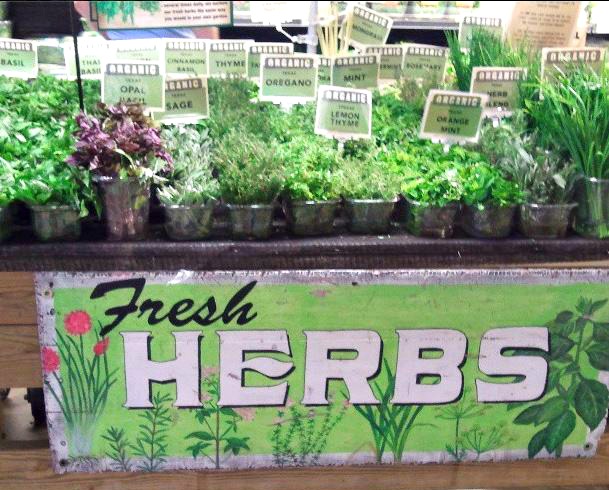
Be Mindful of Sodium. Some salt is fine, especially if you are an endurance athlete like myself who is constantly sweating it out and trying to keep muscle cramping at bay. However, Americans in general eat way too much salt (another reason to toss out notoriously salty processed foods) – an average of 3,400 mg per day according to the FDA. Experts recommend keeping daily sodium consumption under 1,500 mg. If you are eating (or drinking!) to much sodium, I suggest “weening” yourself by making a 500 mg to 1000 mg reduction every few days until your taste buds adapt. I like to add no-salt flavor to foods by using a varied of fresh herbs or by adding lemon or lime slices to my water or zested citrus peel to my recipes. 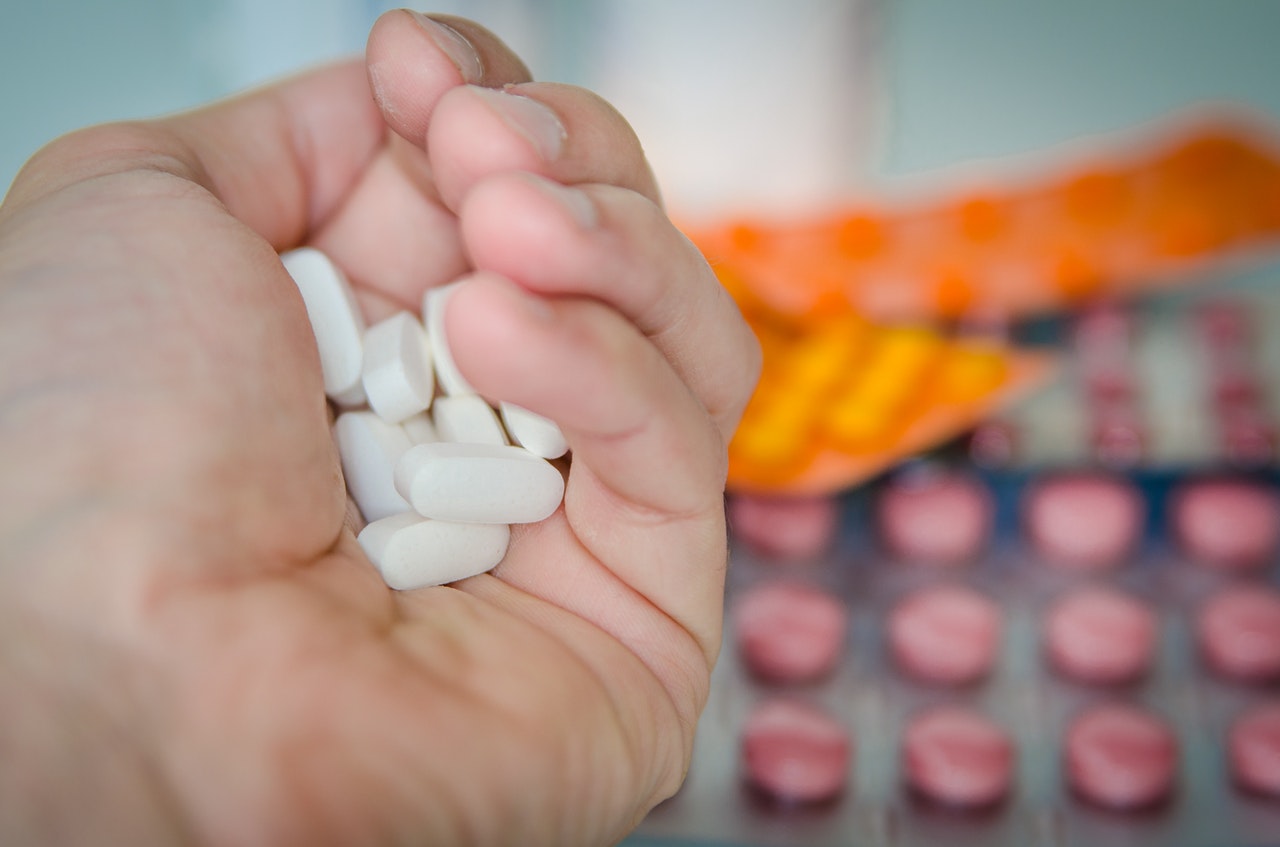
Evaluate Prescription & OTC Medications: People are often completely unaware about some factors that can increase blood pressure. These can include certain medications like corticosteroids used to control arthritis, asthma or other conditions, and certain migraine medicines have also been shown to increase blood pressure. Of course, many NEED these medications for health management and quality of life — your doctor can make the best-informed decision about what’s medically necessary for you. Additionally, commonly-used OTC medications like decongestants and NSAIDs (think aspirin, ibuprofen, naproxen, etc.) can elevate blood pressure. For these reasons, I do not use OTC medications gratuitously, but in moderation when needed, and always consult with my pharmacist and/or doctor for guidance.
So, back to the story about my Dad. I’m blessed beyond words to say that despite the high blood pressure, cardiovascular disease (and also, recently, brain cancer that is in remission) my dad is still around, getting around and loving me in real life! My family just celebrated his 74th birthday last week, and he is still active and well enough to be traveling the world with my mom and gaining his strength and health back every day. My parents are living their best lives with a renewed focus on making small lifestyle changes to support their health and well-being – and to keep high blood pressure under control.
When was the last time you checked your blood pressure, do you know the numbers? What is the biggest hurdle in the lifestyle changes I mentioned above do you find the hardest . . . or are the proudest of accomplishing? Please share in the comments – XOXO, Jennifer

This is great information. Believe it or not, I struggle with keeping my blood pressure in order in spite of my vegan lifestyle and fitness level. I’m sure reducing my salt intake will help, so that’s next on the list. I did read that eating blueberries daily can be effective as medication, but I don’t have a source for that.
I did not know that about the blueberries . . . this totally validates my spending a ton of money on them lol
Such great information for maintaining a low blood pressure. I actually sometimes have blood pressure with too big of a split between the numbers which can make me feel lightheaded.
Thanks for reading the post Sandra . . I’ve had that light-headed feeling too (only when standing up) Do you have it at other times too?. . . I need to ask my doctor about it.
Hi and thanks for the article!
I am looking at natural ways to reduce my BP and also came across a device at helpbreathing.com. Anyone tried it?
Regards,
Suzie